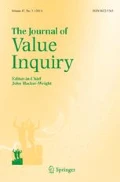Conclusions
One conclusion has already been reached, namely, the diagnosis of the problems of Rousseau's political thought. Again, this is not to say that Locke or Hobbes is correct and Rousseau incorrect, but only to observe that one cannot mix myths without getting into the deepest trouble. But there are several other observations of a more general nature that I want to make. First, the considerations introduced above are intended to point out something of the character of the language of political theory. It is an error to treat such language as if it were assimilable to the verifiability model of scientific language (this was the mistake of both Hume and Weldon). The language of political theory, such as social contract theory, bears a much closer relationship to religious language than it does to at least that model of scientific discourse, for it is basically mythic in character. Speaking still in terms of the verifiability model of scientific discourse, political theories such as social contract are neither true nor false. If one means by “cognitively meaningful” the same thing as “true or false,” then one would be constrained to say that such political theories are meaningless. But the point is that although such theories cannot be shown to be either true or false in that rather simple-minded way that both Hume and Weldon require, they are in fact meaningful, and cognitively so. The essential difference is that the Hume-Weldon model requires that cognitive discourse be descriptive, while the view here advanced rejects this.
It is perhaps worth noting, that the Hume-Weldon (positivistic) model has rather gone out of fashion even in the paradigmatic case of the language of science. The difficulties of the verifiability theory of meaning are legion and are well-known to philosophers of science. The problem is, however, that those difficulties and the more recent developments in the theory of scientific language arising out of those difficulties are not equally well known to all philosophers and not known at all outside philosophy. Thus a great many philosophers and practically all nonphilosophers operate with an outmoded theory of language and this theory, unfortunately, governs most of the discussion about political theory.
Second, a problem related to that of verification arises out of a consideration of the relationships among mythic structures. For example, it is sometimes maintained that the American democratic system rests on a certain religious point of view: that we are a Christian nation. I am not concerned to attack or defend this position. I want only to observe that it is conceivable that myths may “stack” in certain ways, that hierarchies of mythic structures are possible, such that under one very general kind of myth (such as Marxism), certain subordinate or lower-order myths are permissible and others are not. Among these high-order myths may be certain metaphysics, such as Spinozism or Platonism, or certain religions. Consequently, in addition to such “verification” procedures as have already been suggested, there may be another, namely, the determination of the compatibility of the given myth with others of higher order. If this is so, then one must be careful not to assume that his particular political myth is compatible with just any other point of view he might hold.
Finally, returning once more to Rousseau, there is the difficulty involved in getting out of one myth and into another. Religious thinkers have always known about this, for it is the problem of conversion. But philosophers have tended to think that all one had to do was present some arguments and everyone would come around to that point of view. What has been missed is the blikish element, and this undoubtedly explains why there have been virtually no philosophical conversions by argument. Scientific disputes can usually (though not always) be resolved by the introduction of evidence, but if religious points of view and political myths (like the social contract) are bliks, then they determine what will be accepted as evidence and consequently no evidence will count against them. As I have already said, I think this is too strong. There is a blikish element in myths, but in a very large, although recognizable, sense, they are “verifiable.” Even so, the fact that in myth one is presented with a picture, a drama, of which one is a part and not, as in the descriptive model of scientific language, with a set of propositions of which the knowing subject is independent, this fact, I say, makes all the difference in the world so far as switching positions is concerned. Thus, as Rousseau's case suggests, it is extremely hard to get out of one myth, one blik, one way of looking at the world, and into another. This suggests why Democrats do not often become Republicans, why Buddhists do not often become Christians, and why teen-agers complain that their parents do not understand them.
Similar content being viewed by others
Author information
Authors and Affiliations
Rights and permissions
About this article
Cite this article
Carnes, J.R. Myths, bliks, and the Social Contract. J Value Inquiry 4, 105–118 (1970). https://doi.org/10.1007/BF00136884
Issue Date:
DOI: https://doi.org/10.1007/BF00136884



